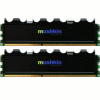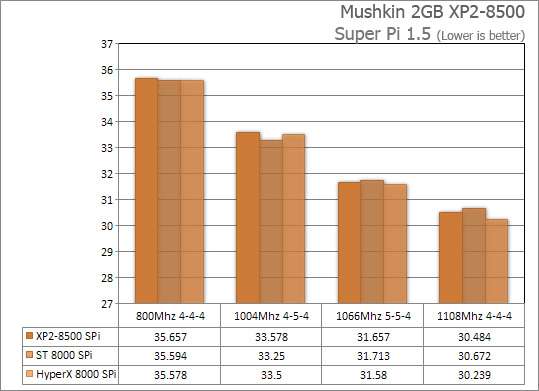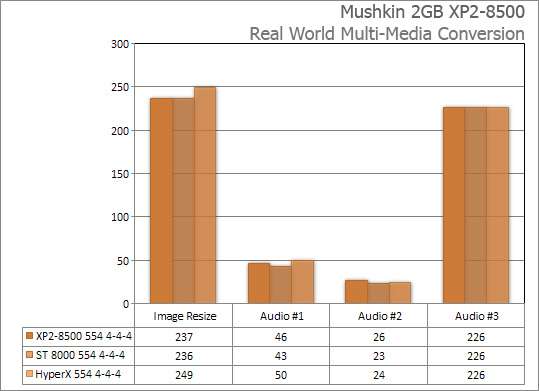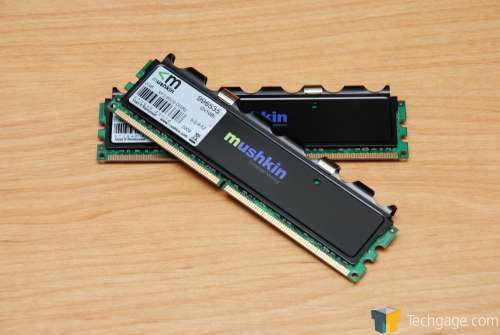- Qualcomm Launches Snapdragon 4 Gen 2 Mobile Platform
- AMD Launches Ryzen PRO 7000 Series Mobile & Desktop Platform
- Intel Launches Sleek Single-Slot Arc Pro A60 Workstation Graphics Card
- NVIDIA Announces Latest Ada Lovelace Additions: GeForce RTX 4060 Ti & RTX 4060
- Maxon Redshift With AMD Radeon GPU Rendering Support Now Available
Mushkin 2GB XP2-8500

It’s been a few months since we’ve had the opportunity to play with a Mushkin kit, but we now have their XP2-8500 on the hotseat. We compare its performance to Super Talents and Kingstons top kits to see who comes out on top.
Page 4 – Super Pi, Real World, Final Thoughts
Super Pi is a great tool for wagering the performance of your CPU. The faster the chip, the faster your computer can compute 1 million digits past the decimal in a not so simple Pi equation. Memory latencies and speeds can play a big part in the success of low scores (that being a good thing) so it’s good to include it in our tests.

Ditto. The Kingston proved better capable of handling the lower times overall though.
In order to provide more accurate results in our memory and CPU reviews, we are currently in the process of reconsidering which tools we use. We will no longer use PC Mark 05 or 3D Mark 01 in our memory reviews simply because the scores fluctuate far too much in between each test, making it unreliable.
That said, one area of computing that will benefit from faster CPU and memory speeds is multi-media work. This can include DVD Ripping, video conversion, audio conversion and even image conversion. The latter three will be included in our results below. These tests will be refined in the coming weeks and we are hoping to have a solid multi-media benchmarking suite to use in our future reviews.
Before the results though, allow me to explain which each process consists of:
- Image Resize: 234 JPEG images at 10 Megapixel settings (3872×2592) which are batch resized to 800×600
- Audio #1: 15 FLAC files (549MB) are decoded to WAV (flac -d)
- Audio #2: 15 WAV files (783MB) are combined to become 1 (shntool join -o wav)
- Audio #3: A 783MB WAV file is converted into a 320Kbps MP3 (lame -b 320)

The results are quite interesting here, and prove that there must be some factor that helps one of the kits be faster overall regardless of timings. All of the kits here had identical settings, yet the first three tests vary considerably. The Audio #3 on the other hand, doesn’t move between either kit.
Thanks to my gimped CPU, it’s hard to be impressed by any new kit that flies onto my desk, since most of them can handle the same max overclock that my system can handle. This Mushkin kit was no surprise, it handled it just fine. However, it did throw us a few curveballs that I will bring up.
First off… the voltages. That’s the only thing that really differs this kit from the others I tested with. The stock voltages are 2.2-2.3v, but 2.2 was not possible for me because MemTest would throw errors around. 2.3v took care of that entirely though, so should you choose to pick this kit up that’s what you can expect. You may get lucky with 2.2v though, who knows. It doesn’t matter in the end really, it’s not a significant difference.
At our max overclock though, the same problem came into play. While the Kingston and Super Talent kit handled DDR2-1100 speeds with only 2.4v, the XP2-8500 required 2.53v. Even 2.50v would give me some errors, but 2.53v went through a 1000% test error free. So, these are voltage hungry, but so are enthusiast overclockers ;-)
Price wise, these modules retail for $400 which places them in line with the competition. Corsairs kit costs $10 less and Kingstons kit costs $40 more. Take this as you will. At this price range, you cannot go wrong, at least with the modules mentioned. All of them have plenty of overclocking headroom, depending on your CPU. If you have a beefy AMD that can hit 3.0GHz or a nice Core 2 Duo, you should be able to hit DDR2-1200 as long as you are willing to pump up the voltages. I am awarding the XP2-8500 an 8 out of 10… a great showing from Mushkin.
If you have a comment you wish to make on this review, feel free to head on into our forums! There is no need to register in order to reply to such threads.

|
|
Support our efforts! With ad revenue at an all-time low for written websites, we're relying more than ever on reader support to help us continue putting so much effort into this type of content. You can support us by becoming a Patron, or by using our Amazon shopping affiliate links listed through our articles. Thanks for your support!






